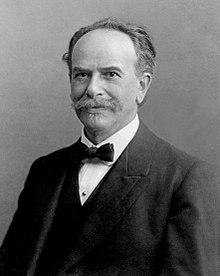Franz Boas
German-American anthropologist
Franz Boas (July 9, 1858 – December 22, 1942) was a German-American anthropologist and a pioneer of modern anthropology who has been called the "Father of American Anthropology".

The passion for seeking the truth for truth's sake...can be kept alive only if we continue to seek the truth for truth's sake.
- Franz Boas (1945)
- Franz Boas (1945)
| This scientist article is a stub. You can help out with Wikiquote by expanding it! |
Quotes
edit- Eugenics should, therefore, not be allowed to deceive us into the belief that we should try to raise a race of supermen, nor that it should be our aim to eliminate all suffering and pain. The attempt to suppress those defective classes whose deficiencies can be proved by rigid methods to be due to hereditary causes, and to prevent unions that will unavoidably lead to the birth of disease-stricken progeny, is the proper field of eugenics. How much can be and should be attempted in this field depends upon the results of careful studies of the law of heredity. Eugenics is not a panacea that will cure human ills, it is rather a dangerous sword that may turn its edge against those who rely on its strength.
- Eugenics, in The Scientific Monthly, J. McKeen Cattell, ed., Vol. 3, No. 5,(November, 1916)[1][2].
- Courtesy, modesty, good manners, conformity to definite ethical standards are universal, but what constitutes courtesy, modesty, good manners, and definite ethical standards is not universal. It is instructive to know that standards differ in the most unexpected ways,
- Boas (1928) in foreword to Margaret Mead (1928) Coming of Age in Samoa.
- Anthropology has reached that point of development where the careful investigation of facts shakes our firm belief in the far-reaching theories that have been built up. The complexity of each phenomenon dawns on our minds, and makes us desirous of proceeding more cautiously. Heretofore we have seen the features common to all human thought.
- Franz Boas (1975) Facial paintings of the Indians of northern British Columbia. p. 4.
- It is obvious, therefore, that attempts to classify mankind, based on the present distribution of type, language and culture, must lead to different results, according to the point of view taken; that a classification based primarily on type alone will lead to a system which represents more or less accurately the blood- relationships of the people; but these do not need to coincide with their cultural relationships. In the same way classifications based on language and culture do not need to coincide with a biological classification.
- (1911, reprinted 1965: 142) 1911 [1965]. The Mind of Primitive Man, revised edition. New York: The Free Press.
- Then we shall treasure and cultivate the variety of forms that human thought and activity has taken, and abhor, as leading to complete stagnation, all attempts to impress one pattern of thought upon whole nations or even upon the whole world.
- (1911, reprinted 1965: 242). 1911 [1965]. The Mind of Primitive Man, revised edition. New York: The Free Press.
Race and Democratic Society (1945)
edit- The passion for seeking the truth for truth's sake...can be kept alive only if we continue to seek the truth for truth's sake.
- Introduction.
- The behavior of an individual is determined not by his racial affiliation, but by the character of his ancestry and his cultural environment.
- Chapter 2.
- No one has ever proved that a human being, through his descent from a certain group of people, must of necessity have certain mental characteristics.
- Chapter 7.
Quotes about Franz Boas
edit- Boas’s historical particularism, which is closely connected with cultural relativism, consists of the view that every society has its own, unique history, which is to say that there are no ‘necessary stages’ that societies pass through. As a result, it is impossible to generalise about historical sequences; they are all unique. All societies have their own paths towards social sustainability and their own logic of continuity and change, Boas argued. Both this view and certain forms of cultural relativism have always been debated among anthropologists, but they have been deeply influential up to the present.
- Thomas Hylland Eriksen, What is Anthropology? (2nd ed., 2017), Ch. 1 : Why Anthropology?
External links
edit- Franz Boas Papers at the American Philosophical Society